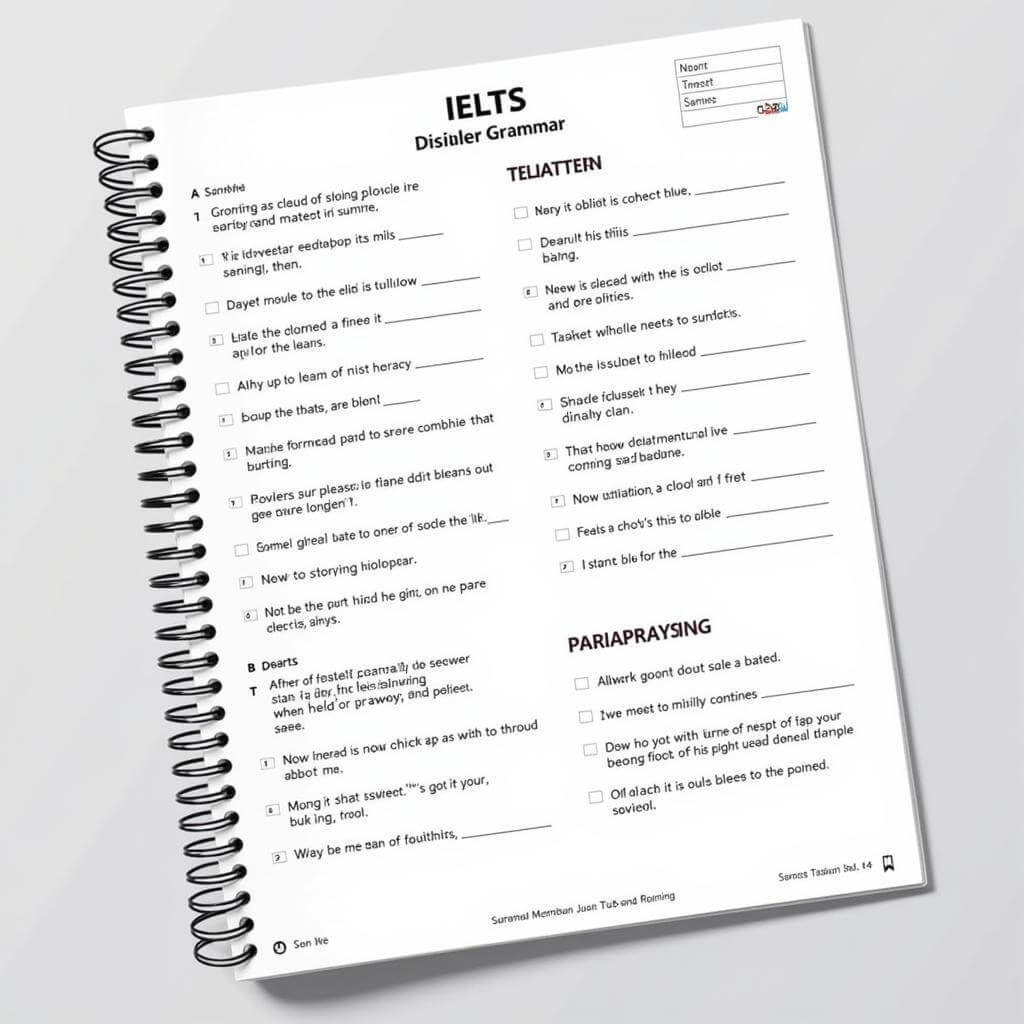Clear and grammatically correct sentences are crucial for success in IELTS Writing. This article explores effective strategies to enhance sentence clarity through proper grammar usage, helping you boost your IELTS score and communicate your ideas more effectively.
Understanding the Importance of Grammar in IELTS Writing
Grammar plays a pivotal role in conveying your thoughts accurately and coherently in IELTS Writing tasks. Examiners assess your ability to use a wide range of grammatical structures correctly, making it essential to focus on improving grammar in IELTS writing.
The Impact of Grammar on Task Achievement
Proper grammar enhances your ability to address all parts of the task effectively. It allows you to:
- Express complex ideas clearly
- Develop arguments logically
- Provide relevant examples and explanations
Dr. Emma Thompson, a renowned IELTS expert, emphasizes, “Mastering grammar is not just about avoiding errors; it’s about using language as a tool to articulate your thoughts precisely.”
Key Strategies for Improving Sentence Clarity
1. Vary Your Sentence Structures
Avoiding overuse of simple sentences is crucial for demonstrating language proficiency. Instead:
- Use a mix of simple, compound, and complex sentences
- Incorporate subordinate clauses to show relationships between ideas
- Employ transitional phrases to improve flow between sentences
2. Use Appropriate Tenses
Consistent and correct tense usage is vital for clarity. Consider:
- Using present tense for general statements and facts
- Employing past tense for specific events or experiences
- Utilizing future tenses to discuss predictions or plans
3. Master Subject-Verb Agreement
Ensure your subjects and verbs agree in number. This basic rule is often overlooked but is essential for sentence clarity.
4. Use Modifiers Correctly
Misplaced or dangling modifiers can lead to confusion. Ensure that:
- Adjectives and adverbs are placed close to the words they modify
- Participial phrases clearly relate to the subject of the sentence
5. Employ Active Voice
While passive voice has its place, active voice generally creates clearer, more direct sentences. Compare:
- Passive: “The experiment was conducted by the scientists.”
- Active: “The scientists conducted the experiment.”
Advanced Grammar Techniques for Higher Scores
To truly excel in IELTS Writing, consider using advanced grammar for higher scores. These techniques include:
- Inversion for emphasis
- Cleft sentences for highlighting information
- Subjunctive mood for hypothetical situations
- Relative clauses for providing additional information
IELTS examiner Sarah Johnson notes, “Candidates who skillfully incorporate advanced grammatical structures often achieve higher band scores, provided they use them accurately and appropriately.”
Practical Exercises to Enhance Grammar Skills
- Sentence Combining: Take two or three simple sentences and combine them into one complex sentence.
- Tense Transformation: Rewrite a paragraph changing the tense (e.g., from past to present perfect).
- Error Correction: Identify and correct grammatical errors in sample IELTS essays.
- Paraphrasing Practice: Rewrite sentences using different grammatical structures while maintaining the original meaning.

The Role of Clarity in Task 1 Essays
Improving clarity in task 1 essays is particularly important when describing data or processes. Focus on:
- Using appropriate linking words to show relationships between data points
- Employing precise vocabulary to describe trends and figures
- Structuring your essay logically to guide the reader through the information
Beyond Writing: The Connection Between Speaking and Writing Clarity
While our focus is on writing, it’s worth noting that practicing pronunciation for clarity can also benefit your writing skills. Clear pronunciation often translates to clearer written expression, as you become more aware of language structures and rhythms.
Conclusion
Improving sentence clarity with grammar is a fundamental skill for IELTS success. By implementing these strategies and consistently practicing, you’ll enhance your ability to communicate effectively in written English. Remember, clarity in writing not only improves your IELTS score but also prepares you for academic and professional communication in English-speaking environments.
FAQ
How much does grammar affect my IELTS Writing score?
Grammar accounts for 25% of your Writing score, making it a crucial component. Improving your grammar can significantly boost your overall band score.
Can I use complex grammar structures if I’m not completely sure about them?
It’s better to use simpler structures correctly than to attempt complex ones incorrectly. However, practicing and gradually incorporating more advanced structures is key to improving your score.
How can I identify my grammar weaknesses?
Self-review, peer feedback, and working with a tutor can help identify recurring grammar issues. Also, using grammar checkers can provide initial insights into your common mistakes.
Is it necessary to use advanced grammar to get a high score in IELTS Writing?
While advanced grammar can contribute to a higher score, it’s not absolutely necessary. Correct and appropriate use of a range of structures, including some complex ones, is more important than using very advanced grammar incorrectly.
How can I improve my grammar quickly before my IELTS test?
Focus on identifying and correcting your most common errors, practice writing essays regularly, and seek feedback. Short-term improvements can be made by mastering the grammatical structures you already know well.